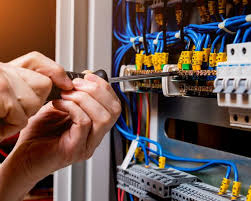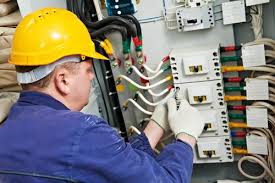Electricians – What Their Work Includes
What is the job of most electricians? What do they do? Most people think of electricians as people that only come to your house to fix an electrical problem. Well, they do that a lot, but they also do other work that serves not only individuals but also large companies, the state, etc. Usually, the job of an electrician lasts about forty hours a week. That, however, doesn’t mean that it is fixed. Sometimes, they may work overtime. Other times, it may be necessary to supervise a certain machine for hours.

Work Environment
Electricians work indoors and out, at construction sites, in homes, and in businesses or factories. The work may be strenuous at times and may include bending conduit, lifting heavy objects, and standing, stooping, and kneeling for long periods. Electricians risk injury from electrical shock, falls, and cuts, and must follow strict safety procedures to avoid injuries. Data from the U.S. Bureau of Labor Statistics show that full-time electricians experienced a work-related injury and illness rate that was higher than the national average. When working outdoors, they may be subject to inclement weather. Some electricians may have to travel long distances to jobsites.
Most electricians work a standard 40-hour week, although overtime may be required. Those who do maintenance work may work nights or weekends and be on call to go to the worksite when needed. Electricians in industrial settings may have periodic extended overtime during scheduled maintenance or retooling periods. Companies that operate 24 hours a day may employ three shifts of electricians.
Training
Most electricians learn their trade in a 4- or 5-year apprenticeship program. For each year of the program, apprentices must complete at least 144 hours of technical training and 2,000 hours of paid on-the-job training. In the classroom, apprentices learn electrical theory, blueprint reading, mathematics, electrical code requirements, and safety and first-aid practices. They also may receive specialized training related to soldering, communications, fire alarm systems, and elevators.
After completing an apprenticeship program, electricians are considered to be journey workers and may perform duties on their own, subject to any local licensing requirements. Because of this comprehensive training, those who complete apprenticeship programs qualify to do both construction and maintenance work.
Several groups, including unions and contractor associations, sponsor apprenticeship programs. The basic qualifications to enter an apprenticeship program are as follows:
- Minimum age of 18
- High school education or equivalent
- One year of algebra
- Qualifying score on an aptitude test
- Pass substance abuse screening
Some electrical contractors have their own training program. Although most workers enter apprenticeships directly, some electricians enter apprenticeship programs after working as a helper.

What Do Electricians Do
Electricians install, maintain, and repair electrical wiring, equipment, and fixtures. Ensure that work is in accordance with relevant codes. May install or service street lights, intercom systems, or electrical control systems. They also plan layout and installation of electrical wiring, equipment, or fixtures, based on job specifications and local codes.
Other tasks include:
- Connect wires to circuit breakers, transformers, or other components.
- Test electrical systems or continuity of circuits in electrical wiring, equipment, or fixtures, using testing devices, such as ohmmeters, voltmeters, or oscilloscopes, to ensure compatibility and safety of system.
- Use a variety of tools or equipment, such as power construction equipment, measuring devices, power tools, and testing equipment, such as oscilloscopes, ammeters, or test lamps.
- Inspect electrical systems, equipment, or components to identify hazards, defects, or the need for adjustment or repair, and to ensure compliance with codes.
- Prepare sketches or follow blueprints to determine the location of wiring or equipment and to ensure conformance to building and safety codes.
- Diagnose malfunctioning systems, apparatus, or components, using test equipment and hand tools to locate the cause of a breakdown and correct the problem.

What Types of Electrician
Below are just a few examples of possible jobs you could take on when trained as an electrician:
- Domestic Electrical Installers
Perhaps the most common type of electrician, domestic electrical installers work on domestic properties. So that’s small and larger jobs around the home, ranging from simple socket fixes to installation of wiring throughout a property.
- Installation Electrician
You’ll be responsible for installing systems such as lighting, security, power, fire protection systems and structure cabling.
This job is slightly larger in scope than a domestic electrical installer’s work, as it allows the possibility of working on larger projects. Installation electricians can work anywhere ranging from construction sites to commercial properties.
- Maintenance Electrician
Maintenance electricians ensure that modern electrical systems and the equipment that they serve are always running effectively, safely and efficiently.
This can involve anything from maintaining the power grid to fixing problems with machinery within factories.
- Electrotechnical Panel Builder
They use programmable logic controllers and information technology to build and manage the electrical control panels that control buildings heating, ventilation, air conditioning and refrigeration equipment.
- Instrumentation Electrician
This job involves commissioning, testing, fault finding and the repairing of building environmental control systems, such as large air conditioning units, heating and refrigeration.
- Electrical Machine Repairer & Rewinder
Skilled electrical machine repair and rewind specialists are required to repair and maintain equipment machinery such as transformers, compressors, pumps and fans within buildings.
- Highway Electrical Systems Electrician
Trained highway electrical systems electricians ensure that our street lighting, including traffic management systems are continuously managed and maintained to a high standard.

Recent Comments